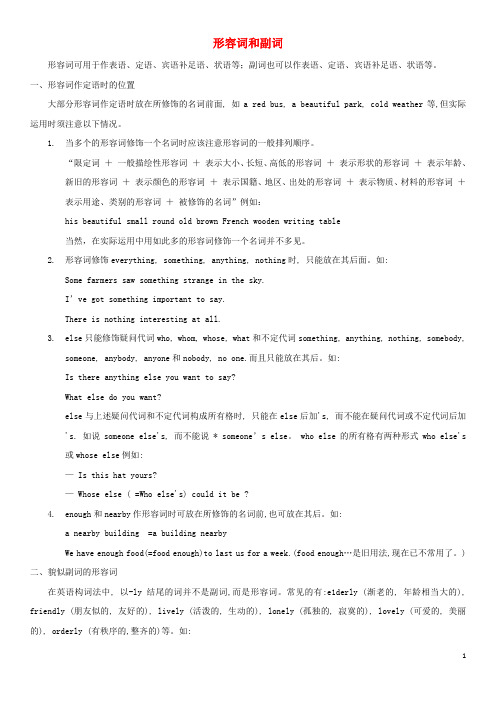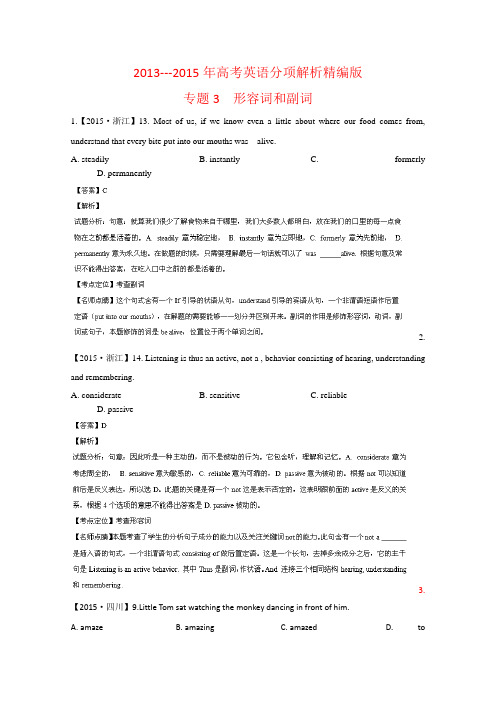2013高考英语 经典陷阱题大串讲 形容词与副词类
典型高考英语陷阱题详解-形容词

典型高考英语陷阱题详解•形容词与副词1. We don’t care if a hunting dog smells _________, but we really don’t want him to smell _________.A. well, wellB. bad, badC. well, badlyD. badly, bad【陷阱】容易误选B,认为两个smell 均为连系动词,后接形容词作表语。
【分析】这是1995年的一道上海高考题,最佳答案为D。
句中的第一个smell 为实义动词,意为“闻气味”、“嗅觉”,smell badly 意为“嗅觉差”;第二个smell 为连系动词,意为“闻起来(有某种气味)”,smell bad 意为“闻起来气味难闻”。
全句意为“我们并不介意一条猎狗的嗅觉不好,但我们的确不希望它的气味难闻”。
2. “_________ do you think of your English teacher?”“Oh, he is an _________ man.”A. What, interestingB. What, interestedC. How, interestingD. How, interested【陷阱】容易误选D,认为第一空应填how,表示how“如何”;第二空应填interested,因为有的书上说–ing 形容词主要说明事物,-ed 形容词主要说明人。
【分析】其实最佳答案应是A。
英语中表示汉语的“你觉得……如何?”时,可用How do you like ...? 或What do you think of ...? 注意两者搭配不同,即like 与how 搭配,think of 与what 搭配。
另一方面,有的书认为:-ing 形容词说明事,-ed 形容词说明人。
此说法在很多情况下是可行的,但表述欠严谨。
严谨的表述应该是:表示使(别)人感到如何), 用-ing形容词;表示人自己本身感到如何,用-ed 形容词。
高考英语一轮复习语法点专题讲解形容词和副词

形容词和副词形容词可用于作表语、定语、宾语补足语、状语等;副词也可以作表语、定语、宾语补足语、状语等。
一、形容词作定语时的位置大部分形容词作定语时放在所修饰的名词前面, 如a red bus, a beautiful park, cold weather等,但实际运用时须注意以下情况。
1.当多个的形容词修饰一个名词时应该注意形容词的一般排列顺序。
“限定词+一般描绘性形容词+表示大小、长短、高低的形容词+表示形状的形容词+表示年龄、新旧的形容词+表示颜色的形容词+表示国籍、地区、出处的形容词+表示物质、材料的形容词+表示用途、类别的形容词+被修饰的名词”例如:his beautiful small round old brown French wooden writing table当然,在实际运用中用如此多的形容词修饰一个名词并不多见。
2.形容词修饰everything, something, anything, nothing时, 只能放在其后面。
如:Some farmers saw something strange in the sky.I’ve got something important to say.There is nothing interesting at all.3.else只能修饰疑问代词who, whom, whose, what和不定代词something, anything, nothing, somebody,someone, anybody, anyone和nobody, no one.而且只能放在其后。
如:Is there anything else you want to say?What else do you want?else与上述疑问代词和不定代词构成所有格时, 只能在else后加's, 而不能在疑问代词或不定代词后加's. 如说someone else's, 而不能说* someone’s else。
三年高考(2013-2015)英语试题分项精析版——专题03 形容词和副词(解析版) .doc

2013---2015年高考英语分项解析精编版专题3 形容词和副词1.【2015·浙江】13. Most of us, if we know even a little about where our food comes from, understand that every bite put into our mouths was alive.A. steadilyB. instantlyC. formerlyD. permanently2.【2015·浙江】14. Listening is thus an active, not a , behavior consisting of hearing, understanding and remembering.A. considerateB. sensitiveC. reliableD. passive3.【2015·四川】9.Little Tom sat watching the monkey dancing in front of him.A. amazeB. amazingC. amazedD. toamaze4.【2015·四川】7.Andy is content with the toy. It is he has ever got.A. a betterB. the betterC. a bestD. the best5.【2015·福建】23.It was________of Michael to inform us of his delay in case we got worried.A. carelessB. considerateC. patientD. generous【答案】B【解析】试题分析:考查形容词辨析A.careless不小心的;B.considerate体贴的;C.Patient有耐心的;D.generous慷慨的。
高考英语短文改错考点类析2-4-形容词和副词

高考英语短文改错考点类析2-4-形容词和副词(总2页)--本页仅作为文档封面,使用时请直接删除即可----内页可以根据需求调整合适字体及大小--高考英语短文改错考点类析:形容词与副词一、考点规律分析短文改错对形容词与副词的考查主要涉及:形容词和副词比较等级的误用(尤其是在本身已是比较级的词前误加more)、形容词与副词的混用(如修饰动词时误用形容词或修饰名词时误用副词)等,另外,用作表语时该用形容词的却误用了名词、简短副词(如 in, down 等)的误加与漏用、涉及形容词搭配的as…as 结构、how 与 what 的混用等也是常考的考点。
二、真题单句归纳(1) After an hour or so we began to feel very frightening.(2) Charles said, “As soon as I see a realy tall building, I want to climb it.(3) Last Sunday, police cars hurry to the taller building in New York.(4) As a result, people in the modern world generally live much more longer than people in the past.(5) Therefore, there are still some countries where people have shorter lives.(6) People in industrial countries can expect to live for twice so long as people who lived a few hundred years ago.(7) In some places you may borrow many books as you want.(8) I told Mother, Father, Sister and all my friends here that a great time I had.(9) I never knew a ride down a river could be so much exciting.(10) I’m sure we’ll have a wonderfully time together.(11) First, let me tell you something more about myself.(12) I used to play ping-pong a lot in my spare time, but now I am interestingin football.(13) Also, the sport teaches us the important of obedience.(14) Unfortunate, there are too many people in my family.(15) I think I liked those classes because I felt that they helped me understand what the world works.(16) After learning the basics of the subject, nothing else seemed very practically to me.(17) Whenever I see them I will often think of my English teacher.(18) What things are in other homes, I wonder.(19) For instance, one night he played strong and loudly music till fouro’clock in the morning.(20) But he is difference now.(21) The time passes quickly. Evening came down.(22) …alth ough radios can be very noise.(23) …all planned and written by grown-ups to make children want things that they don’t real need.(24) But one of the best players in our team told me just then that he wouldn’t play basketball any more.(25) But one of th e best players in our team told me just now that he wouldn’t play basketball once more.(26) I would describe myself as shy and quietly.(27) Finding information on the Net is easily.(28) Yes, a concert can be very excited.(30) Nowadays millions of people of all age take pleasure in a hobby which is both interested and fun.(31) She called 119 immediate.(32) However, we seldom felt lonely or helplessly.三、模拟单句演练(1) I’ll try to be more carefully next time.(2) China is much more bigger than the United States.(3) There are few boys than girls in our class.(4) He says that skiing is much exciting than skating.(5) The more money you make, the most you spend.(6) He found someone was following her, so she felt frightening.(7) It was real very dangerous. You might have injured yourself.(8) In fact, we finished the work without any difficult.(9) Look at the asleep boy. How lovely!(10) The fish tastes well; why not have a try?(11) Last week was very rain. I didn’t go out the whole week.(12) The sun rises in the east and sets down in the west.(13) I promise to return back before 10.(14) The book contains much use information. It’s well worth reading.(15) This is quite far the mostly expensive bicycle in the shop.(16) The workers warm welcomed us at their offices.(17) Oh, it’s simply wonderfully to see you here!(18) She is in more health now than she was last year.。
高考英语 经典陷阱题大串讲 形容词与副词类

2013高考英语经典圈套题大串讲·描述词与副词类1.We don’t care if a hunting dog smells _________, but we really don’t want him to smell _________.A. well, wellB. bad, badC. well, badlyD. badly, bad【圈套】容易误选B,认为两个smell 均为连系动词,后接描述词作表语。
【分析】这是1995年的一道上海高考题,最好答案为D。
句中的第一个 smell 为实义动词,意为“闻气味”、“嗅觉”,sm ell badly 意为“嗅觉差”;第二个 smell 为连系动词,意为“闻起来(有某种气味)”,smell bad 意为“闻起来气味难闻”。
全句意为“我们并不介意一条猎狗的嗅觉不好,但我们的确不希望它的气味难闻”。
2.“_________ do you think of your English teacher?”“Oh, he is an _______ man.”A. What, interestingB. What, interestedC. How, interestingD. How, interested【圈套】容易误选D,认为第一空应填 how,表示“如何”;第二空应填 interested,由于有的书上说–ing 描述词次要阐明事物,-ed 描述词次要阐明人。
【分析】其实最好答案应是A。
英语中表示汉语的“你觉得……如何?”时,可用How do you like ...? 或 What do you think of ...? 留意两者搭配不同,即 like 与 how 搭配,think of 与 what 搭配。
另一方面,有的书认为:-ing描述词阐明事,-ed 描述词阐明人。
此说法在很多情况下是可行的,但表述欠严谨。
严谨的表述该当是:表示使(别)人感到如何, 用-ing描述词;表示人本人本身感到如何,用-ed描述词。
【高考】英语陷阱题总结归纳——形容词与副词(附详解)

【高考】英语陷阱题总结归纳——形容词与副词(附详解)---炳辉书店---高考英语陷阱题总结归纳——形容词与副词◆典型陷阱题分析◆1.We don’t care if a hunting dog smells _____, but we really don’t want him to smell ____.A. well, wellB. bad, badC. well, badlyD. badly, bad【陷阱】容易误选B,认为两个smell 均为连系动词,后接形容词作表语。
【分析】这是1995年的一道上海高考题,最佳答案为D。
句中的第一个smell 为实义动词,意为“闻气味”、“嗅觉”,smell badly 意为“嗅觉差”;第二个smell 为连系动词,意为“闻起来(有某种气味)”,smell bad 意为“闻起来气味难闻”。
全句意为“我们并不介意一条猎狗的嗅觉不好,但我们的确不希望它的气味难闻”。
2.“_____ do you think of your English teacher?” “Oh, he is an _____ man.”A. What, interestingB. What, interestedC. How, interestingD. How, interested【陷阱】容易误选D,认为第一空应填how,表示“如何”;第二空应填interested,因为有的书上说–ing 形容词主要说明事物,-ed 形容词主要说明人。
【分析】其实最佳答案应是A。
英语中表示汉语的“你觉得……如何?”时,可用How do you like ...? 或What do you think of ...? 注意两者搭配不同,即like 与how 搭配,think of 与what 搭配。
另一方面,有的书认为:-ing形容词说明事,-ed形容词说明人。
此说法在很多情况下是可行的,但表述欠严谨。
英语陷阱题6——形容词与副词

英语陷阱题——形容词与副词【例题】1.We don’t care if a hunting dog smells _____, but we really don’t want him to smell ____.A. well, wellB. bad, badC. well, badlyD. badly, bad <陷阱>容易误选B,认为两个smell 均为连系动词,后接形容词作表语。
<分析>这是1995年的一道上海高考题,最佳答案为D。
句中的第一个smell 为实义动词,意为“闻气味”、“嗅觉”,smell badly 意为“嗅觉差”;第二个smell 为连系动词,意为“闻起来(有某种气味)”,smell bad 意为“闻起来气味难闻”。
全句意为“我们并不介意一条猎狗的嗅觉不好,但我们的确不希望它的气味难闻”。
2.“_____ do you think of your English teacher?” “Oh, he is an _____ man.”A. What, interestingB. What, interestedC. How, interestingD. How, interested<陷阱>容易误选D,认为第一空应填how,表示“如何”;第二空应填interested,因为有的书上说–ing 形容词主要说明事物,-ed 形容词主要说明人。
<分析>其实最佳答案应是A。
英语中表示汉语的“你觉得……如何?”时,可用How do you like ...? 或What do you think of ...? 注意两者搭配不同,即like 与how 搭配,think of 与what 搭配。
另一方面,有的书认为:-ing形容词说明事,-ed形容词说明人。
此说法在很多情况下是可行的,但表述欠严谨。
严谨的表述应该是:表示使(别)人感到如何, 用-ing形容词;表示人自己本身感到如何,用-ed形容词。
易错点22 语法填空:有提示词之形容词和副词(3大陷阱)-备战2024年高考英语考试易错题(解析版

易错点22 有提示词之形容词和副词目录01 易错陷阱(3大陷阱)02 举一反三【易错点提醒一】词性、词形转换类易混易错点【易错点提醒二】级别类易混易错点【易错点提醒三】用法类易混易错点03 易错题通关易错陷阱1:词性、词形转换类易混易错点。
【分析】形容词一般在词尾加-ly变为副词,但也有不规则变化形式需牢记。
易错陷阱2:级别类易混易错点。
【分析】易错陷阱3:用法类易混易错点。
【分析】形容词作定语用于修饰名词,常谓语名词之前;分词形容词作表语时,-ing类常修饰事物,如:exciting, surprising, moving, puzzling等;-ed类副词形容词常修饰人或人的表情,如:excited, surprised, moved, puzzled等。
形容词作状语,修饰主语,与主语构成逻辑上的主系表关系。
副词作状语,修饰动词、形容词、副词和句子。
【易错点提醒一】词性转换类易混易错点【例1】(广东省深圳市红岭中学2023-2024学年高三统考试题)It is an ancient _________ (architecture) complex with a history of more than 600 years. In the Ming and Qing Dynasties, twenty-four emperors lived here ruling China for nearly 500 years.【答案】architectural【解析】考查形容词。
句意:它是一个有600多年历史的古代建筑群。
分析句子可知,此处应为形容词,作定语修饰名词“complex”,表示“建筑的”。
故填architectural。
【变式1】(广东省佛山市南海区2023-2024学年高三测试题)“Hospitable Shandong” has become an __ (influence) tourism brand(品牌).【答案】influential【解析】考查形容词。
- 1、下载文档前请自行甄别文档内容的完整性,平台不提供额外的编辑、内容补充、找答案等附加服务。
- 2、"仅部分预览"的文档,不可在线预览部分如存在完整性等问题,可反馈申请退款(可完整预览的文档不适用该条件!)。
- 3、如文档侵犯您的权益,请联系客服反馈,我们会尽快为您处理(人工客服工作时间:9:00-18:30)。
2013高考英语经典陷阱题大串讲·形容词与副词类1.We don’t care if a hunting dog smells _________, but we really don’t w ant him to smell _________.A. well, wellB. bad, badC. well, badlyD. badly, bad【陷阱】容易误选B,认为两个smell 均为连系动词,后接形容词作表语。
【分析】这是1995年的一道上海高考题,最佳答案为D。
句中的第一个 smell 为实义动词,意为“闻气味”、“嗅觉”,smell badly 意为“嗅觉差”;第二个 smell 为连系动词,意为“闻起来(有某种气味)”,smell bad 意为“闻起来气味难闻”。
全句意为“我们并不介意一条猎狗的嗅觉不好,但我们的确不希望它的气味难闻”。
2.“_________ do you think of your English teacher?” “Oh, he is an _____ __ man.”A. What, interestingB. What, interestedC. How, interestingD. How, interested【陷阱】容易误选D,认为第一空应填 how,表示“如何”;第二空应填 interested,因为有的书上说–ing 形容词主要说明事物,-ed 形容词主要说明人。
【分析】其实最佳答案应是A。
英语中表示汉语的“你觉得……如何?”时,可用How do you like ...? 或 What do you think of ...? 注意两者搭配不同,即 like 与 how 搭配,think of 与 what 搭配。
另一方面,有的书认为:-ing形容词说明事,-ed形容词说明人。
此说法在很多情况下是可行的,但表述欠严谨。
严谨的表述应该是:表示使(别)人感到如何, 用-ing形容词;表示人自己本身感到如何,用-ed形容词。
比较:All the children are interested. 所有的孩子都很感兴趣。
All the children are interesting. 所有的孩子都很有趣。
I read an interested expression on his face. 我看到他脸上露出一种感兴趣的表情。
I read an interesting expression on his face. 我看到他脸上露出一种有趣的表情。
再比较:He is frightened. 他很害怕。
He is frightening. 他很吓人。
He has a frightened look on his face. 他脸上带有惊恐的神情。
He has a frightening look on his face. 他脸上带有吓人的神情。
3. I think he is _________ to tell us the secret, but I’m not sure.A. possibleB. likelyC. impossibleD. certain【陷阱】A、B、C三项均有可能被选择。
【分析】根据句意首先排除D;再根据上面一题的分析,排除A和C;也就是说,此题最佳答案为B。
注意likely 的用法,它与possible所用句型不同,请看实例:Are we likely to arrive in time? 我们会及时赶到吗?It’s very likely that he will r ing me tonight. 今晚他很可能会给我来电话。
They will very likely come by car. 他们很可能会坐汽车来。
(该句中的likely为副词,而前两句中的likely为形容词)4.Let’s make it at seven o’clock on Tuesday morning at my office if ____ _____.A.you’re convenientB. it is convenient for youC. you feel convenientD. it is convenient with you【陷阱】容易误选A或C,因为许多同学将汉语中的“如果你方便的话”直译为 if yo u are conv enient 或 if you feel convenient。
【分析】最佳答案为B,因为英语中的 convenient不是表示“感到方便的”,而是表示“使人感到方便的”,所以 be convenient 的主语通常不能是“人”。
要表示“如果你方便的话”,英语通常 if it is convenient for [to] you,其中的介词可用 for 或 to,但一般不用 with。
顺便说一句,偶尔也可见到用人或物作 be convenient的主语,但此时的句子必须具备这样的特点:句子主语是其后不定式的逻辑宾语,如:Mary is convenient to see on Sunday. / It is convenient to see Mary on Sund ay. 星期天去见玛丽较为方便。
The furniture is convenient to move. / It is conveni ent to move the furnit ure. 这家具搬起来很方便。
5. We were two hours late that day, which was due to the _________.A. crowded trafficB. crowded trafficsC. busy trafficD. busy traffics【陷阱】容易误选A,因为许多同学将汉语中的“拥挤的交通”直译为 crowded traff ic(s);由于 traffic 不可数,排除含 traffics 的选项,所以许多考生便选定答案A。
【分析】其实,此题的最佳答案是C,因为英语的 traffic 习惯上不用 crowded 修饰,而用 busy 或 heavy 修饰,以说明“交通”的“拥挤”。
类似这样的在修饰语方面需特别注意的还有:(1)汉语的“绿茶”说成英语是green tea,但相应的“红茶”却是black tea 而不是 red tea。
(2)可说thick soup(浓汤),但不说thick coffee (tea);要表示“浓咖啡(茶)”,可用strong coffee (tea)。
(3)可说thin soup(稀汤),但不说thin coffee (tea);要表示“淡咖啡(茶)”,可用weak coffee (tea)。
6. Mary is very clever and _________ worth teaching, but her brother is not. Look, he is now _________ asleep in class.A.very, veryB. much, veryC. well, veryD. well, fast【陷阱】容易误选A,因为许多学生往往将汉语中的“很”与英语中的 very 等同。
【分析】但是,许多汉语中的“很”是不能用英语中的 very 来直译的。
如汉语“我很喜欢英语”,在英语中就不能说成 I very like English,而应说成 I like Englis h v ery much,因为副词 very 在英语中习惯上不用来修饰动词。
上面一题不能选A,是因为形容词 worth 和 asleep 习惯上不能用副词 very 来修饰,而是分别用 well 和 fast修饰,即说成 be well worth doing sth(很值得做某事),be fast (或 sound) asleep(熟睡),所以此题的最佳答案应选D。
7. Entering the house we found him lying on the bed with his mouth ________ _ and eyes _________.A. open, closeB. opened, closedC. opened, closeD. open, closed【陷阱】此题很容易误选A。
【分析】答案应选 D。
open 和 close 均可用作动词,前者表示“开”,后者表示“关”,是一对反义词,如:Please open your mouth and close your eyes. 请张开嘴,闭上眼。
但是 open 和 close 也可用作形容词,此时前者意为“开着的”,后者意为“接近的”、“亲近的”等,而并不表示“关着的”,要表示“关着的”,英语用 clos ed,即用作形容词时,open 与close 不是一对反义词,而与 closed 才是反义词。
8. A _________ road goes _________ from one place to another.A. straight, straightB. straightly, straightlyC. straight, s traightlyD. straightly, straight【陷阱】容易误选C。
认为straightly 是straight 的副词形式。
【分析】在现代英语中,straight 既可用作形容词,也可用作副词。
而straightly这个副词在现代英语中已被废弃,许多词典均不再收录此词。
所以此题最佳答案应选A。
